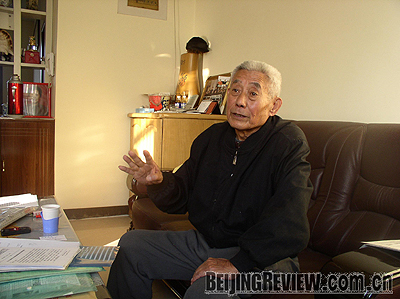|
|
 CORDIAL INVITATION: Shi Changxiang, a 73-year-old resident of Zouping, says U.S. scholars have been welcomed there for three decades to investigate and observe life in rural China (LAN XINZHEN)
CORDIAL INVITATION: Shi Changxiang, a 73-year-old resident of Zouping, says U.S. scholars have been welcomed there for three decades to investigate and observe life in rural China (LAN XINZHEN) |
Shi Changxiang, 73, often looks through his old photographs of the various U.S. scholars who have paid numerous research visits to Zouping County in east China's Shandong Province over the last three decades, observing and recording the way of life in the rural county. Some of the photos show local families and others are of Shi and the scholars.
When Zouping became the first place in rural China opened to U.S. scholars in the 1980s, Shi was in change of their local itinerary.
The program came about in 1979, when late Chinese leader Deng Xiaoping paid his first visit to the Untied States. Deng and the Americans reached a general agreement on exchanging students and scholars. It included a memorandum of understanding that the Committee on Scholarly Communication with China and the United States National Academy of Sciences would send scholars to rural areas in China every year. The scholars would stay there for some time to gain firsthand living and research experience. At the time, the Americans believed they could not have full knowledge of China without understanding its rural areas, where 80 percent of the population lived. The two sides proposed the selection of a place in the countryside for investigation and research.
The Chinese Government had planed to select a county in the coastal area as the spot for the U.S. scholars, Shi said. But since China had just embarked upon its reform and opening-up policies and people were still not open-minded, officials in many provinces declined the offer. It was not until October 1984 that Shandong Province accepted the invitation and suggested four counties from which U.S. scholars could choose.
In June 1985, Thomas Bernstein, a professor of School of Political Science of Columbia University, visited Zouping. In July and August 1986, the Americans sent Guy Salvatore Alitto and Gold, history professors from the University of Chicago, to Zouping for an overall inspection. That same year, the county set up an office of foreign affairs to receive scholars from the United States. Shi, then 51 years old, was appointed the director of the office.
The Zouping County Government selected nine villages for American scholars to observe and investigate, Shi said. Because of the poor living standards in the countryside at that time, the villages had no facilities to receive foreigners. The county government allocated special funds of 300,000 yuan ($43,860) to build a two-story building in Fengjia Village. But because the village had no drinkable water wells, the office of foreign affairs sent drinkable water to the village every day. The office also opened an international direct telephone line and set up the first fax machine in the county for the U.S. scholars to use.
|
